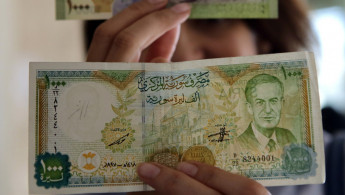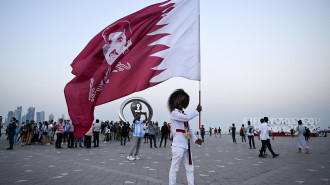Assad regime 'seeking to recover frozen overseas assets'
Assad regime 'seeking to recover frozen overseas assets'
The Syrian regime is seeking to reassert its legitimacy as the international community moves closer to rehabilitating Assad, by taking international legal action to recover its sanctioned assets frozen abroad.
3 min read
The Syrian currency deteriorated dramatically in value since the start of the anti-Assad rebellion [AFP]
The regime of Bashar al-Assad is reportedly taking advantage of the international community's change of heart on Syria after Russia's intervention to start demanding the unlocking of frozen assets under European, US and Arab sanctions imposed between 2011 and 2012.
The reported move follows the failure of the Syrian opposition to retrieve these assets for itself for the past 5 years.
According to reports, the Assad government is preparing legal action targeting governments and banks holding the assets in question.
Recently, the prime minister's office in Damascus circulated memos to all public sector institutions requesting all data and documents in their possession on their frozen funds and assets held by foreign banks under the sanctions regime in place, to be submitted within a month.
The New Arab has learned the Syrian Ministry of Justice intends then to initiate measures to retrieve the frozen funds as the legal representative of the Syrian regime.
Sources in Damascus say the frozen funds belonging to the public sector do not have a large value. Most of the funds were payments made by the Syrian government to foreign companies carrying out projects in Syria, but were frozen under sanctions imposed following the eruption of the Syrian rebellion.
But Imad al-Din al-Mosbeh, Syrian economist, said most of the funds in question are being held in Arab countries, pointing out that contracts and transactions between the government and US and European entities were limited before the rebellion.
Dubious legality
"The Syrian regime is seeking a legal battle not for the sake of the funds, but to restore its legitimacy amid favourable political circumstances," said Ghazwan Qrunful, head of the opposition-aligned Free Lawyers Association, to The New Arab.
Qrunful said that legally speaking, the regime has the right to take action to recover the assets, especially since it remains the representative of the recognised state in Syria.
However, he said, it is not certain the regime's bid would be successful, particularly since the funds could be used to sustain the regime's war effort.
Qrunful speculated that the regime is making its move because it feels the international opposition against it is weakening, allowing it to regain some international legitimacy.
However, Qrunful stressed the opposition would respond through legal means to challenge the regime's case as well as the contracts and deals signed with the regime's allies in the future.
In a press conference on Monday, head of Syria's Bar Association Nizar Ali al-Sakif called for filing a lawsuit on behalf of the regime with the International Court of Justice to recover the frozen assets.
Sakif said the Bar Association would offer its expertise to support any measures by the government if needed.
"Looted funds"
Meanwhile, there are no official figures regarding the funds that have been smuggled out of Syria by regime affiliates, but estimates place the figure at $35 to $40 billion.
According to the Syrian opposition, the issue of these "looted" funds has been met with indifference by the countries where they are being held, despite repeated demands by the ad-hoc legal commission formed by the opposition led by Haitham al-Maleh.
"The legal office of the Syrian National Coalition has sent many memos to organisations and nations holding the funds to hand them over, but there has been no compliance save for freezing some of these assets," said Nasr al-Hariri, former secretary general of the SNC, to The New Arab.
The reported move follows the failure of the Syrian opposition to retrieve these assets for itself for the past 5 years.
According to reports, the Assad government is preparing legal action targeting governments and banks holding the assets in question.
Recently, the prime minister's office in Damascus circulated memos to all public sector institutions requesting all data and documents in their possession on their frozen funds and assets held by foreign banks under the sanctions regime in place, to be submitted within a month.
The New Arab has learned the Syrian Ministry of Justice intends then to initiate measures to retrieve the frozen funds as the legal representative of the Syrian regime.
Sources in Damascus say the frozen funds belonging to the public sector do not have a large value. Most of the funds were payments made by the Syrian government to foreign companies carrying out projects in Syria, but were frozen under sanctions imposed following the eruption of the Syrian rebellion.
But Imad al-Din al-Mosbeh, Syrian economist, said most of the funds in question are being held in Arab countries, pointing out that contracts and transactions between the government and US and European entities were limited before the rebellion.
 |
The Syrian regime is seeking a legal battle not for the sake of the funds, but to restore its legitimacy amid favourable political circumstances |  |
"The Syrian regime is seeking a legal battle not for the sake of the funds, but to restore its legitimacy amid favourable political circumstances," said Ghazwan Qrunful, head of the opposition-aligned Free Lawyers Association, to The New Arab.
Qrunful said that legally speaking, the regime has the right to take action to recover the assets, especially since it remains the representative of the recognised state in Syria.
However, he said, it is not certain the regime's bid would be successful, particularly since the funds could be used to sustain the regime's war effort.
Qrunful speculated that the regime is making its move because it feels the international opposition against it is weakening, allowing it to regain some international legitimacy.
However, Qrunful stressed the opposition would respond through legal means to challenge the regime's case as well as the contracts and deals signed with the regime's allies in the future.
In a press conference on Monday, head of Syria's Bar Association Nizar Ali al-Sakif called for filing a lawsuit on behalf of the regime with the International Court of Justice to recover the frozen assets.
Sakif said the Bar Association would offer its expertise to support any measures by the government if needed.
"Looted funds"
Meanwhile, there are no official figures regarding the funds that have been smuggled out of Syria by regime affiliates, but estimates place the figure at $35 to $40 billion.
According to the Syrian opposition, the issue of these "looted" funds has been met with indifference by the countries where they are being held, despite repeated demands by the ad-hoc legal commission formed by the opposition led by Haitham al-Maleh.
"The legal office of the Syrian National Coalition has sent many memos to organisations and nations holding the funds to hand them over, but there has been no compliance save for freezing some of these assets," said Nasr al-Hariri, former secretary general of the SNC, to The New Arab.
 |
| Read more:The Assad family ties to Israeli business tycoon |



